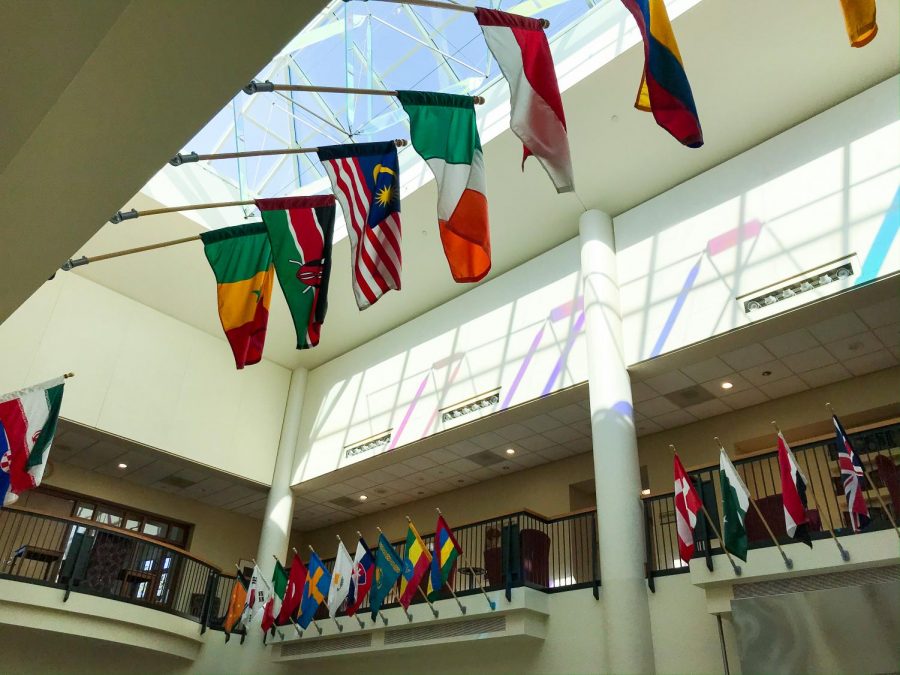International students call on Mac to fight ICE visa restrictions
July 10, 2020
On Monday afternoon, Diana Paz Garcia ’21 was at her family’s home in Mexico City, in the middle of a day of work for her remote internship, when she got news that took her breath away.
She was waiting for a Zoom meeting to begin, scrolling through Twitter to pass the time, when an article popped up on her feed: President Donald Trump’s administration had moved to strip all international college students of their U.S. visas if they attend a college using an online mode of delivery this fall.
“In that moment, I ran out of air,” she said.
Under the Immigration and Customs Enforcement (ICE) policy, students with F-1 or M-1 visas are required to attend at least one in-person class to maintain their immigration status. As more colleges commit to online delivery in the fall as a precaution against the coronavirus pandemic, the directive from the Trump administration could force universities to either commit to in-person classes or lose their international students.
For Paz Garcia, it was the ultimate rejection.
“It’s heartbreaking to love a country that doesn’t love you back,” she said.
While Macalester’s current plan to implement a hybrid model for the fall semester leaves room for international students to meet these visa requirements, a new layer of uncertainty has settled over a semester already shaping up to be the most irregular in the college’s history.
Macalester had offered students the choice to take their classes online if they weren’t willing to return to campus. Now, international students have been stripped of that choice.
“We are left to decide between our health and our education,” Paz Garcia said.
But even if international students choose to take the risk, in-person instruction is by no means guaranteed. If Macalester has to shut down — for a COVID outbreak on campus or by order of the Minnesota Department of Health — they could be left high and dry.
Over the past few days, International Student Programs (ISP) has been flooded with emails and inquiries about what comes next. Staff there are currently working on building an FAQ site with some answers, but it will take time.
In the meantime, ISP has reached out to international students several times, breaking down the policy and attempting to provide some clarity on how it could affect Mac students.
But some students have found the college’s messages unsatisfactory.
On Thursday, July 9, a group of international students sent an open letter to college leadership demanding the senior staff hold a meeting with international students to listen to concerns and answer questions. More than 500 students and alumni cosigned.
“The college mission states that there is special emphasis on internationalism and multiculturalism at Macalester,” the letter reads. “Now, when international students are threatened, we call on Macalester to live up to its values.”
The same day, Macalester President Suzanne Rivera released a statement condemning the ICE announcement and committing to “fight for” international students. She elaborated that the college was reviewing its options with legal counsel.
Rivera also wrote that the college had signed an amicus brief from the Presidents’ Alliance on Higher Education and Immigration in support of Harvard and M.I.T.’s lawsuit against the Trump administration.
Long Nguyen ’21 has been frustrated by the communications from Macalester so far. He found the emails from ISP, for example, confusing. Ultimately, Nguyen has taken to getting information from other colleges’ FAQ pages.
“Macalester has been really slow in dealing with this kind of issue,” Nguyen said. “If Macalester wants to commit to internationalism, they should take action and actually pay attention and care for international students.”
For Nguyen, going back to his home country of Vietnam suddenly may not be an option. Not only are one-way flights thousands of dollars, but travel between the U.S. and Vietnam has been spotty during the pandemic. Last month, one of Nguyen’s friends tried to go home, only to have their flights canceled at the last minute.
Back in March, Vietnam limited incoming travel to charter flights, banning passenger planes. While that restriction has since relaxed, a second wave of the virus could tighten it again, making sudden travel even more difficult and expensive.
If the worst-case scenario comes to pass, and international students are deported from the U.S., Assistant Director of ISP Luyen Phan said that they should be able to complete their Macalester degree remotely, from outside of the states.
But they will lose many of the other benefits that come with a student visa, like working off-campus, getting an internship or the opportunity to extend their visa after graduation.
Getting a new visa would cost students $350 and force them to wait nine months before becoming eligible for the visa benefits again.
Some students, like Nita Senesathith ’21, may not be able to get another visa at all. Senesathith is from Laos, a country the U.S. stopped granting visas to back in March.
Senesathith wants the college to find a way to guarantee that international students can take at least one of their classes in-person regardless of the college’s broader mode of delivery. She suggested professors offer an in-person independent study to any international student facing deportation.
Leaving the country, leaving Macalester, and leaving behind everything she’s worked for is not an option.
“Personally, study abroad was my dream,” Senesathith said. “And coming from a developing country, you want to go and improve yourself and really bring back the education to go back home and really do important… meaningful things.”
As a first-generation college student who came to Macalester on a scholarship, finishing her degree represents something bigger than herself.
“This education means a lot to us — to our family,” Senesathith said. “And even, I can say, it can mean [a lot] for Laos, too, that someone will go and get high-quality education and come back home and help improve a small, landlocked country in Southeast Asia.”
Paz Garcia encouraged Macalester to remember the humanity of its international students as it navigates the coming battle to protect them. She’s been disheartened by some media coverage that has highlighted international students’ economic contributions, rather than their individual worth.
“We are also humans, and I think there’s human value we bring into the classes,” she said. “I do believe that having people from all around the world does enrich our classrooms and does enrich our experience.”
The Mac Weekly will continue to report on this story as it develops.
Nethmi Bathige and Estelle Timar-Wilcox contributed to the reporting of this story.














